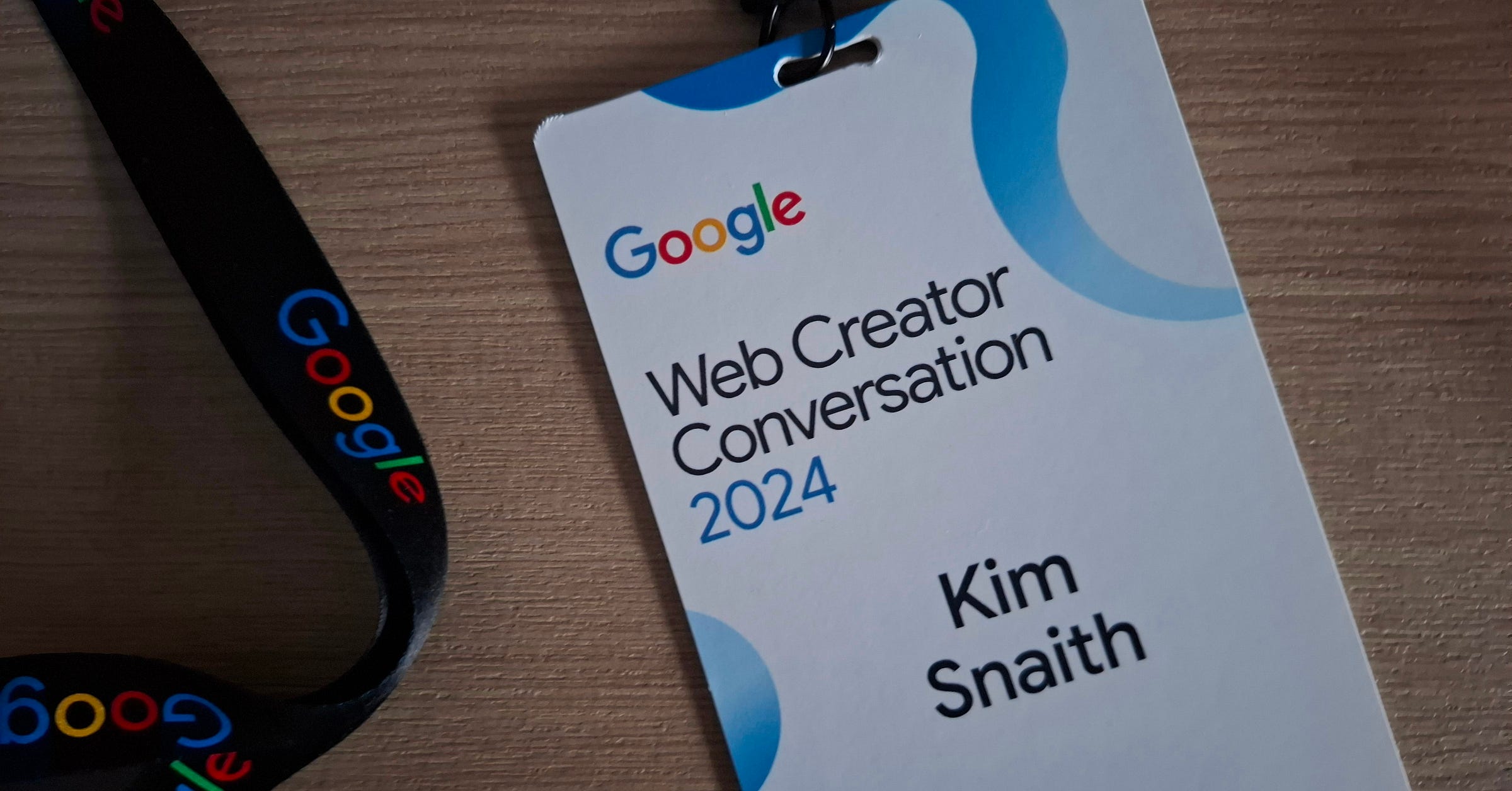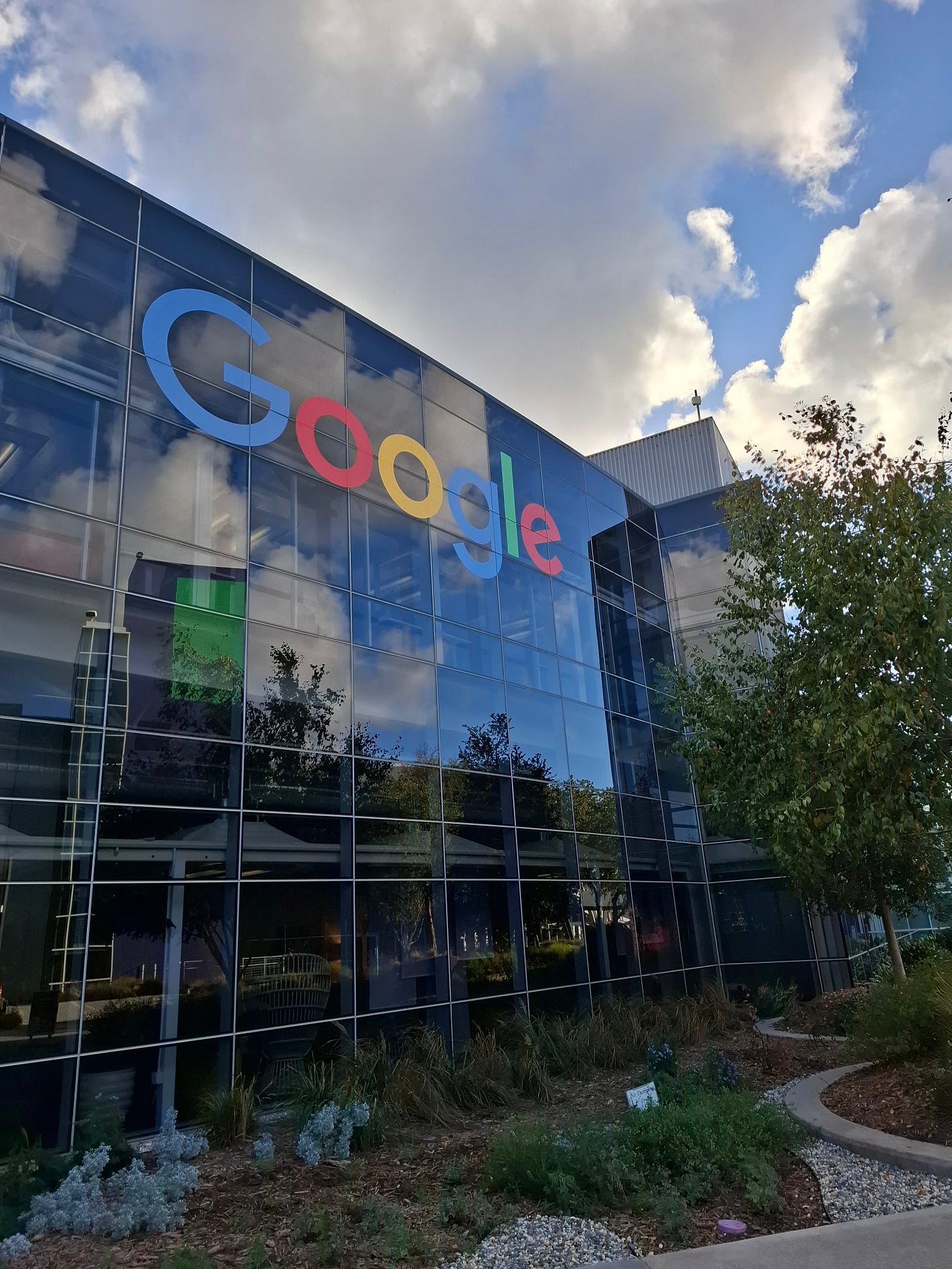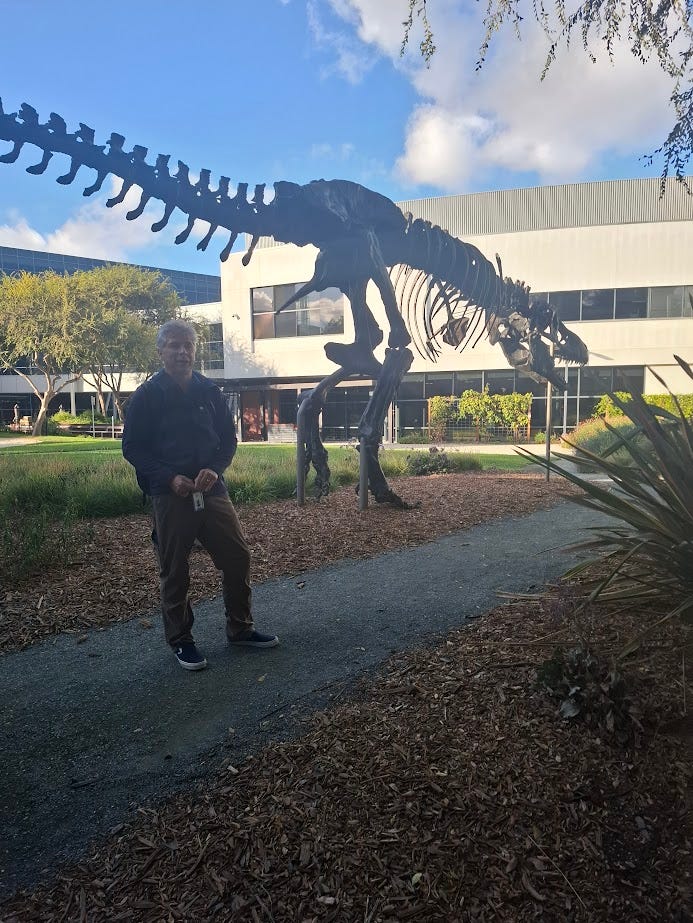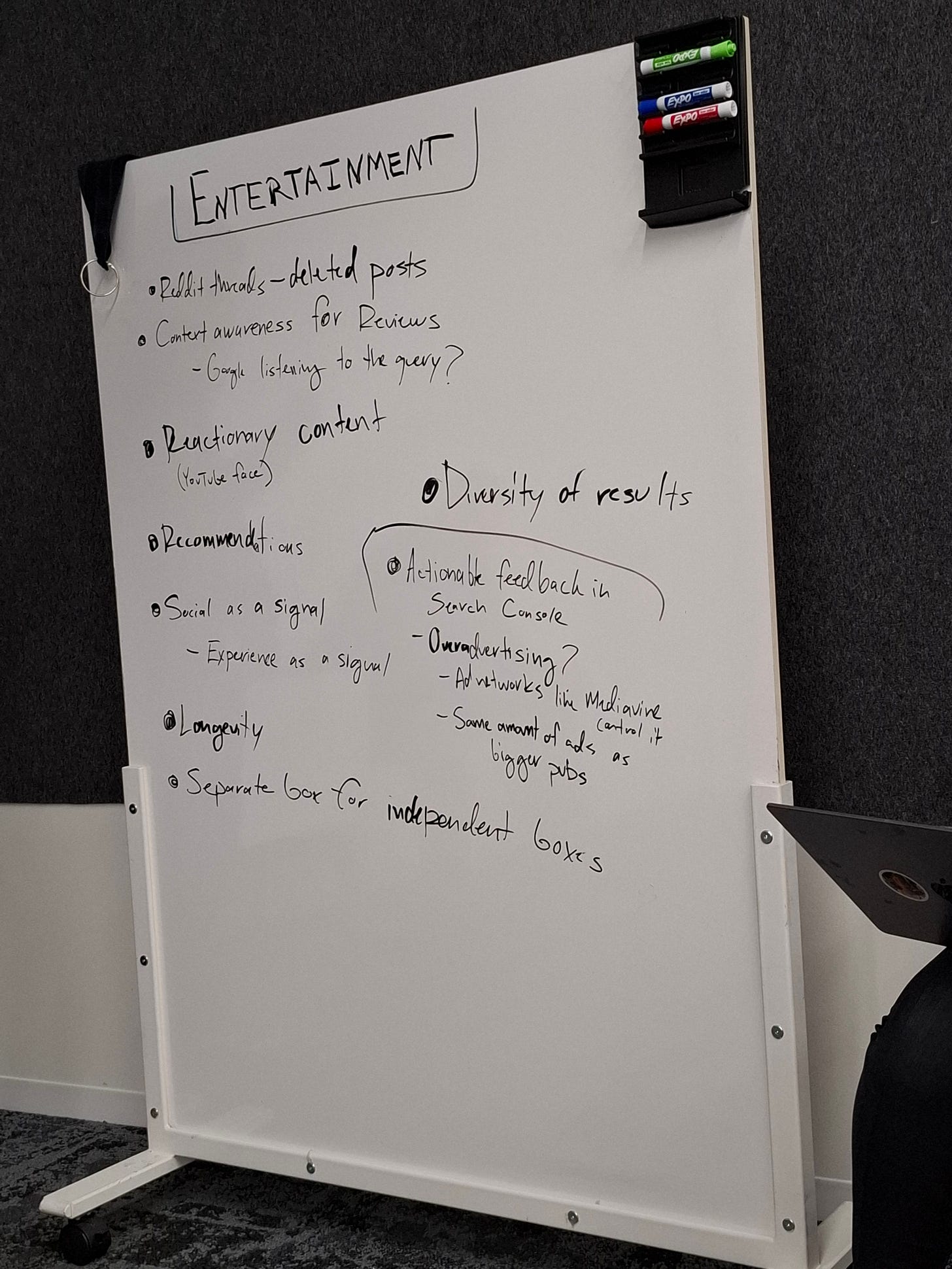I was invited to Google HQ to talk about my failing website. Here's how that went.
One week ago today, I was sat in a board room at Google’s campus in Mountain View, California. It was for an event called the Google Web Creator Conversation 2024 and, along with a group of other like-minded site owners, I’d been invited to take part in a day of discussions about Google Search, about the HCU, and what Google can do to help.
Bear with me, because this is going to be long. But here I’ll be sharing what happened during the course of the day, my thoughts on what was said and, now that I’ve had a week to process it, what I’ll be doing going forward.
Here's the background (at its most simple):
In September 2023 something called the HCU - Helpful Content Update - rolled out on Google search. Its on-paper intention was to ensure results surfaced via search were, well, helpful and good. In practice the fallout from HCU has been quite the opposite. Hundreds of thousands of good quality websites were wiped from the face of the planet. Or at least Google's planet. But if you write for the web, that's pretty much the same thing.
GameSpew was largely unaffected by the September 2023 HCU update. Our traffic began to decline around the end of December but at the time we put it down to seasonal fluctuations (people play a lot of games over the Christmas holidays. They go back to work or school in January and they stop). It didn't go back up though. In March, with Google's next update, we lost 50% of our traffic in a day. Eight months later, none of it has come back.
While our situation sucks - GameSpew is our entire household income and losing more than 50% is a huge blow - we are one of the fortunate ones. Other website owners have lost 70, 80, in some instances even 100% of their traffic. We're hanging on by a thread, but that thread is at least something.
The Google Creator Conversation: what is it and how did people get invited?
Around 20 website owners were invited to visit Google's campus in Mountain View, California, to talk about the issues they'd faced over the last year. The emphasis here is on conversation: the initial invite made it very clear we'd get no specific advice or fixes, but Google wanted to hear from affected creators first hand.
Most people's invite came from a feedback form made available by Danny Sullivan - the search liaison for Google - earlier in the year. Not mine: Rich and I kicked ourselves that we never got around to filling out the form. But Danny found me after seeing one of my (many) rants on Twitter/X. He reached out personally, where I shared with him some examples of search results being particularly egregious. A few weeks after that exchange, I got an invite.
Do I regret attending the Google Web Creator Conversation?
This is a loaded question. As soon as the invite came in, I knew I had to say yes, regardless of everything. Even if it was utterly pointless, I had to at least try, right? I was lucky to get invited - thousands didn't - and so I felt I owed it to my own business and my fellow small website owners just to see what came out of it.
What actually did come out of it is nuanced and delicate, as I'll explain in more detail below. And if you've read anyone else's takeaway of the event, you'll have seen lots of different emotions, both good and bad. It wasn't a one-size-fits-all event. We all came away with slightly different takeaways because we all have different businesses and different needs.
From a personal point of view, though, attending has taken its toll. Financially, I'm down about £500: for everyone, Google covered two nights in a hotel either side of the Conversation and paid for flights (United, economy). I paid for a bit of extra time in San Francisco (£140), train fare down to London (£100), Underground to Heathrow and back (£20), Premier Inn at Heathrow (£60), travel to San Francisco and then to Mountain View, and back to the airport (~£40) and then any food and drink outside of the day we spent at Google.
Jet lag has also taken a big, big toll on me getting back home. Travelling for over 20 hours door to door is killer (note: don't travel from Heathrow if you live in the North). I spent Friday, the day after getting home, in bed all day after throwing up all night. Joyous. Literally putting the spew in GameSpew. That also means Rich and I had to postpone our holiday - we were supposed to be heading to the Yorkshire coast that Friday. Bad timing, but that was booked before the Google invite came along.
No, I didn't have to stay extra and spend time visiting San Francisco. But I wasn't flying all that way not to get to do a little travelling for me. It also spread out the flights a little, meaning I wasn't so tired during my time at Google. I have mild ME so I was cautious of how horrible I could potentially feel with the extra jetlag stuck on top. You know, like I did right after my flight home.
A tour around Google HQ
On Monday, the day before the official event, Danny Sullivan invited us to go on a little informal tour around the Google Campus. It was an opportunity to meet Danny for the first time and, for most of us website owners, the first time to meet each other.
The campus tour was not very enlightening. You should read Josh's take over at Giant Freakin Robot if you want to know more about it, with his sardonic and hilarious, but no less true, tale of events. I got a free Doctor Pepper from the company fridge.
The most useful part of that day was getting to speak to Danny as a group. He allayed some of our worries of the coming day - some of us were really nervous - and assured us we could say as much or as little as we felt comfortable with. He answered some basic questions, most of which were covered again at the main event, but even in this informal meeting, Danny was quick to stress “none of you have done anything wrong”. We were stuck in the naughty corner, but it was someone else's fault.
A note on Danny Sullivan, Google's Search Liaison
I think I initially captured Danny's attention on Twitter by being… not so nice. As one of the very few public facing Google employees he's become the target for most ire, from practically everyone affected by the HCU or another of Google's updates. I admit I've been frustrated with him in the past for the non-answers he's given online and the wishy-washy messages he's put out.
Having met him in person, however, I can confidently say that Danny Sullivan is a genuinely nice person. It's clear he has a lot of heart, he cares about his job and, most importantly, he cares about the creators who have been affected by Google's mess. He might be employed by Google but he was quick to fire less than savoury comments about what has happened, made no excuses for the company and made it very clear he was fighting in our corner.
The trouble is, of course, that Danny isn't the one responsible for making changes to Google Search. He can give feedback to technicians and he can lobby for something to change but that's about it. Danny is not Google Search: he's just a human face for it.
But the human part is key. He's not a mouthpiece or a person put to soften the blow of a corporation coming down on you. He was genuinely emotional to hear our stories. I'm generally sceptical towards everyone I meet but it was clear instantly that Danny was incredibly genuine.
Nothing happening here is Danny's fault: he doesn't deserve your ire on Twitter. He just can't do a great deal to help - as much as he'd like to.
The Web Creator Conversation 2024: Not a positive start
Our day, beginning at 8am, had a packed schedule. (Thank God it was on Pacific time because me being up and functional at 8am on Greenwich Mean Time is not something that happens.) Breakfast came first: a paltry but adequate affair of fruit, granola and small breakfast burritos.
At 9am, Danny kicked off proceedings with an introduction, telling us what to expect, going over house rules and following up with a primer to how Google search works.
One of the first slides of the day read as follows:
“Appreciate you being willing to engage in this conversation.
We do want to highlight authentic, human voices and we want to listen and learn how to do that better based on your experiences and feedback.”
Another early slide made it very clear that the Google employees in the room were not going to be able to offer us any useful insights:
“Many of you have shared things in public, open letters, social posts and so on - and in part, because you hope someone at Google is listening.
So while most Googlers here can't answer questions, they are here to hear, learn and use what you share to find ways to improve Search.”
You can see most of the slides in the gallery below.

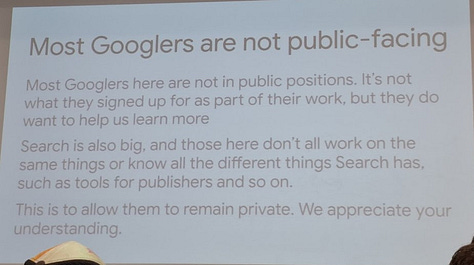
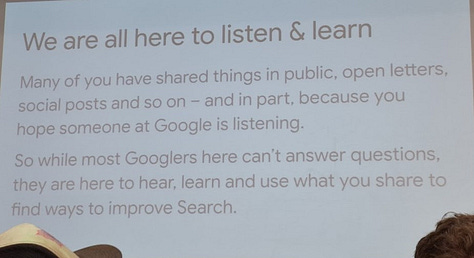
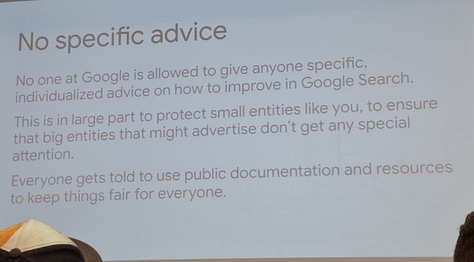
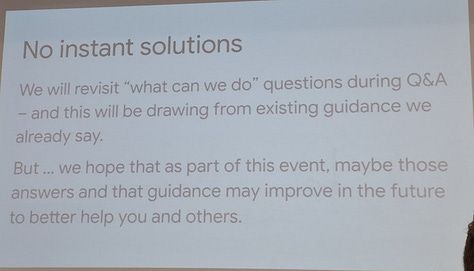
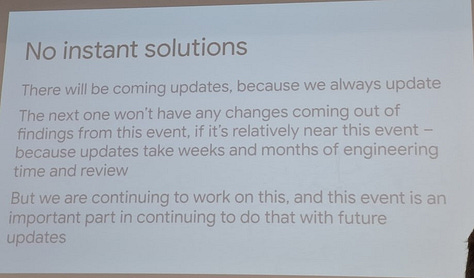
The overall takeaway? Don’t expect to get any real answers out of today. It’s what we were told prior to coming, and it’s what I’d anticipated anyway. But it was still somewhat disappointing to have reiterated so plainly.
This was compounded when Elizabeth Tucker, director of product management at Google Search, stood up to address the room for the first time. Some of her discussion was about Google search in general, but when she told us she had two “North Star” pieces of guidance we should all follow, I was ready to absorb her wisdom.
The first piece of advice? Keep making helpful content. I groaned, and part of me lost all hope for anything good coming out of the rest of the day. If there was one thing I was hoping I wouldn’t hear, it was that one single line. Bad move, Elizabeth. It came off as patronising, ill-informed and completely out-of-touch.
The rest of the Google Event wasn’t a complete waste
Despite the one phrase I really hoped would not get said being released into the room like toxic venom within 20 minutes of the day starting, the rest of the Web Creator Conversation was, at the very least, interesting.
“Let’s Hear From You”
This part of the day was the bit I was most nervous about. We were all given a few minutes to say our piece: some of us chose to tell our story and others chose to share some feedback or an idea with Google (or a bit of both). I hate public speaking so I was so nervous — and ended up completely messing up what I wanted to say. I’d written it all out, but in my infinite wisdom I decided I’d be fine ad-libbing, based off some quick bullet point notes. Readers, I was not fine. I fluffed my words, blabbered over the same bullet points and completely lost track of what I was supposed to be saying. Sigh.
Outside of my own mess, hearing everyone else’s pieces was eye-opening and moving. There were tears from some attendees as they told their heartfelt stories of their livelihoods being destroyed. Others had strong, passionate ideas about what Google should and shouldn’t do. Everyone’s words were compelling, emotionally-driven and coming from a place of knowledge and knowhow. I have utmost respect for every single person who was in that room with me.
For me, this was definitely the most impactful part of the day and I can only hope that the Google staff in the room felt that impact, too.
Breakout Sessions
The larger group was split off into one of four separate sessions: Reviews, Travel, Entertainment and General. Huddled around a whiteboard, each group was joined by a number of Google employees, who fired questions at us. This was very much our time to speak and the Googlers wanted to mine every bit of information they could out of us.
I was in the Entertainment group, where we were asked about the biggest problems we were facing (large corporations came up a lot - hello, Valnet and GAMURS) and any ideas we had that Google could implement to give us a fighting chance.
You can see the notes made on our whiteboard below:
We were very strong on advocating Google Search Console providing more feedback for pages. If something is wrong with our content, let us know. We also talked about having a box-out on Google search highlighting independent outlets, and Google providing greater diversity of results in SERPs. You know, something other than a Valnet site once in a while would be nice.
The Google staff seemed receptive to many of our ideas, but that’s all I can say. Who knows whether anything will get taken back and turned into actual product updates. But it’s out there: they’ve heard what we had to say.
These breakout sessions were followed by a larger group discussion where each smaller group shared their thoughts with everyone else. The key points were largely the same: provide more opportunities for smaller publishers to appear in SERPS, stop prioritising big companies, provide publishers more feedback and give clearer guidance.
Something else that was big in the discussion was the idea of a way for publishers to “verify” themselves on Google: some way of earning a stamp of approval that says “I’m genuine, I know what I’m talking about, I’m not spam”.
Closing Remarks: A Q&A with Elizabeth Tucker and Pandu Nayak
Elizabeth Tucker returned for the final part of the day, and this time she was joined by Pandu Nayak, vice president of search. According to his own website, he’s involved in “various aspects of search quality”. This Q&A was perhaps the most useful point in the day — but also one of the most frustrating. Neither Elizabeth or Pandu showed much empathy for anyone’s situation. Given their senior roles, they also didn’t appear to be very clued up on our situation and gave information that is (or at least seems to be) demonstrably false.
One of the most egregious was Pandu essentially saying site-wide signals aren’t really a thing:
Danny: Can you talk more about what we do in terms of side wide signals and page signals and all the stuff that we keep telling everybody is not so simple?
Pandu: We really think of these as page signals, right? Because you take any site and there’s a wide variety of pages on the site and to have just a single blanket thing across the board would not be appropriate there, except in some spam-like cases and so forth. Having said that, there are definitely priors on sites that then get adjusted by specific page level signals that we will learn from.
The group spent a fair bit of time asking about search quality raters, and while some of this was fairly interesting, I don’t want to focus on it too much, because I don’t think it’s wholly relevant to HCU specifically. But Elizabeth did say this in terms of ads:
I do want to be clear that in our search quality rater guidelines, we do give the raters a lot of instruction, and nowhere do we say ads are bad. You can go and take a look. We actually talk about how it's really important for websites to be able to monetize, to create good content.
Pandu was also asked about recoveries in general by Mike - and you can read his full question on his own blog. But Pandu was very quick to give a non-committal, non-answer:
I can't give you any guarantees about recovery or not. I think that would not be reasonable of me to say this, because I can't predict what, what what will happen, and that's just the unfortunate state of how we operate. Here we are, here listening to you. I think these discussions, the whole reason we're having this conference at all is for us to hear you out, to get the teams to hear you out.
Our goal is to surface great content for our users, right? And I suspect there's a lot of great content you guys are creating that maybe we are not surfacing for our users, and we can do that, but I can't give you any guarantees. Unfortunately, the only thing I can say is we are focused on doing great things for our users, that's not going to change. So to the extent that this is all great content that we are not surfacing, we will continue to find ways to surface it.
What I’ve taken away from the Web Creator Conversation event
There have been some wild takes coming out in the last week from people who weren’t at the event. Only the 20 of us who were there know for sure what was said, what it felt like to be there, what the atmosphere was like, how receptive the Google staff seemed to be to us. We’ve all done our best to share honest reflections with the world at large, but regardless, there are always people who are going to read into what we say and extract the information that best fits their narrative.
Everyone’s takeaways have been different from each other. Some people have taken the information given at the event and read it as “things aren’t going to get any better, so quit”. Others have read it as “there is hope out there”. At no point was it specifically said that there is no hope, and at no point were we told we probably should give up.
One of my posts on Twitter/X has been bandied about a little as “proof” that Google said we should quit. At an informal mixer following the event, someone asked Danny Sullivan what he’d do in our situation and he said “I’d do something else in the meantime”.
But let me dig into this a little more. Danny was posited the situation that he ran a website that lost all of its traffic. Throughout the day he’s already told us multiple times that our sites are not the problem - it’s Google. So why should he do anything other than something else while waiting for Google to fix itself? He isn’t saying give up. He’s saying he should put his energy somewhere else in the meantime. Whether that’s finding a new way to get traffic, or pivoting to a new area, be it video, social media or perhaps something new entirely.
Again, I’m lucky that I haven’t lost 100%. I don’t have to worry about this doomsday situation (at least yet) because I remain hanging on by a thread. Do I believe that Google will “fix” our websites? At some point, yes. I genuinely do believe that whatever classifier is in place, whatever Google has done to suppress us in the search results, will be reversed at some point. It might not be all at once for every site, but I do believe it will happen.
I’ve already seen it happen. We know HouseFresh has had a decent recovery as of the last Google update in August. On the same day, my own little Lego site, ThatBrickSite, had a recovery too.
Below is the last 16 months of clicks from Google and impressions on Google search on thatbricksite.com. You can see we had a huge drop in September 2023, then another big drop in December, until we were getting practically 0 traffic. in August this year, as if a suppressor was instantly lifted, the traffic started going up again.
I did nothing on That Brick Site during that time. For several months it had zero new content because I’d practically given up on it. It feels like it was just a random drop from Google, then a random decision to begin surfacing it in search results again.
Paying lots of money to SEOs is not the answer (and Danny even said as much during the event). I believe them when we’re told our content is not the problem. I genuinely believe it is an issue with search that has good websites caught up unfairly and unnecessarily. It’s up to Google to bring them back, but I’ve seen that they can. I don’t think it’s a purposeful decision. Maybe I’m misguided. Maybe some of my peers are correct in saying that Google is out to destroy small publishers. But in games media at least, I’m seeing lots of sites smaller than GameSpew currently thriving in search results. Some of us have just been unnecessarily caught up in a big update that had some serious problems.
The event wouldn’t have happened if Google didn’t want to help. That was the purpose of it: to gather information from us, learn more about us and get our opinions on things it can do to improve. I’ve seen time and time again people on social media spout that the whole event was simply a PR event for Google. This wasn’t a PR event. I say that with confidence. I think it was a fairly rushed event, put together primarily by Danny to get us meeting face-to-face with Google employees. I genuinely believe Danny is trying to do whatever he can to help us, and this was his best shot. It could have been better, it could have given us more helpful answers, but it’s done with now.
What's next for me and GameSpew?
Like I said above, unlike some of my fellow creators, I did not leave the Google Web Creator Conversation with the message of “give up”. Perhaps that's because I'm in a slightly more fortunate position that I haven't lost all of my traffic. I've lost enough to be severely impacted, but not enough that quitting is a viable option.
GameSpew is mine and Richard's lifeblood. We will continue to fight for it, continue to pour our heart and soul into it and see where the next 3, 6, 12 months take us. We will hope for a recovery, and in the meantime we'll be creating the content we know we can still get something out of - along with looking into new and different ways of keeping afloat. We hope to get back to doing more video content at some point, but we'll still primarily be focusing on the written word because, despite everything, I still believe in it.
For now, I want to draw a line under HCU, SEO and Google conversations. It has completely taken over my life and certainly for the entirety of October it's all I was able to think about. I need to return my efforts and energy into what matters for me, and that's GameSpew (alongside my home life, my wellbeing and my sanity). My social feeds have been taken over by Google related chatter and, frankly, it is exhausting. I will always have time for the fellow creators I met at the Google Event - each and every one of them is an excellent human being - but I'm going to be stepping away from engaging in random HCU discussions for the foreseeable future, because no good ever comes out of them.
I've been to Google, I've fought my corner, I've done all I can. Now it's time to roll my sleeves up and get back to focusing on what's important.
Further reading
I’d highly recommend you read the coverage from other attendees at the Google Web Creator Conversation to get a wider understanding of how the day went. As I’ve said, we’ve all come away with slightly different takeaways, and because we were all present in different discussions at different points of the day, we all have different titbits of information.
These all make for excellent reading, too.
Kylie at Between England and Everywhere: Gaslit By Google? My Thoughts On The 2024 Web Creator Conversation
Mike Hardaker: I Drank the Kool-Aid at the 2024 Google Web Creator Summit
Will at Going Awesome Places: What I Got Out Of Google's Web Creator Conversation Event 2024
Rutledge at Techraptor: Everything I Learned While Visiting Google HQ For the "Web Creator Conversation Event", a Recap
Josh at Giant Freakin Robot: I Attended Google's Creator Conversation Event, And It Turned Into A Funeral
Morgan at Charleston Craft’s thoughts on Twitter
Nate Hake’s thoughts on Twitter


